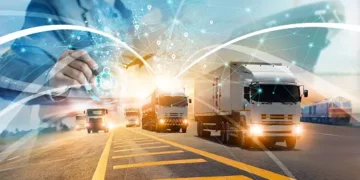Arup, a renowned consulting firm, has released its ‘Future of Goods Movement’ report, providing an in-depth analysis of the evolving landscape of global goods movement. The report aims to help the freight sector anticipate and prepare for future shifts, ensuring resilience in the global economy and promoting sustainability.
The report underscores the substantial impact that transitioning to net-zero emissions and transforming industrial materials will have on global freight. In 2021, energy products constituted 36% of global seaborne trade, which itself accounts for 80% of global freight. This highlights the significant role of these commodities in the worldwide movement of goods.
With approximately 80% of the world’s economy and 77% of global greenhouse gases falling under national net-zero targets, the most traded commodities – agricultural, energy, and metal products – are undergoing major transformations due to efforts in combating climate change and reducing greenhouse gas emissions.
Arup identifies five key shifts in the sector:
- Transitioning to net-zero emissions and addressing overconsumption and waste.
- Prioritizing resilience against growing environmental, social, and economic risks.
- Adapting to changes in global economic powers and their roles in consumption and production.
- Embracing new technology, supply chain modifications, consumer preferences, and retail business models.
- Focusing on the transition of energy and industrial materials.
The report examines the broader systems and networks underpinning goods movement, including the trend towards supply chain optimization. Citing scenarios from McKinsey and Company, it highlights how a single prolonged disruption can significantly impact a business’s annual earnings. In response, companies are diversifying their sourcing and manufacturing, seeking greater supply chain transparency, and implementing redundancy measures.
Manufacturing trends are also evolving, with an increase in reshoring observed. The report points out that, according to a ShipBob survey, rising shipping costs are leading two in five UK-based small businesses to consider switching to local manufacturers.
This publication is part of Arup’s broader initiative in transport and logistics to enhance sustainability in critical, yet often overlooked, networks and systems. Arup collaborates with various stakeholders, including governments and businesses, on projects that aim to make logistics and freight operations more sustainable and resilient. These projects range from policy development and infrastructure changes to helping businesses adapt their operations.
Additionally, Arup has been appointed as an independent industry representative for the UK government’s Freight Council. Established in 2021, this council is the first cross-modal freight forum designed to foster collaboration between the government and the freight sector.
Stay updated with supply chain news at The Supply Chain Report. Learn more about international trade at ADAMftd.com with free tools.
#Arup #FutureOfGoodsMovement #GlobalFreight #NetZeroEmissions #SustainableLogistics #FreightSector #SupplyChainOptimization #GreenhouseGasReduction #IndustrialMaterials #ResilientSupplyChains #TransportAndLogistics #FreightCouncil #McKinsey #ClimateChange #SustainabilityInFreight #EconomicResilience #SupplyChainTrends #TechInSupplyChain #Reshoring #FreightTransformation #EnergyTransition #ManufacturingTrends #LogisticsInnovation















